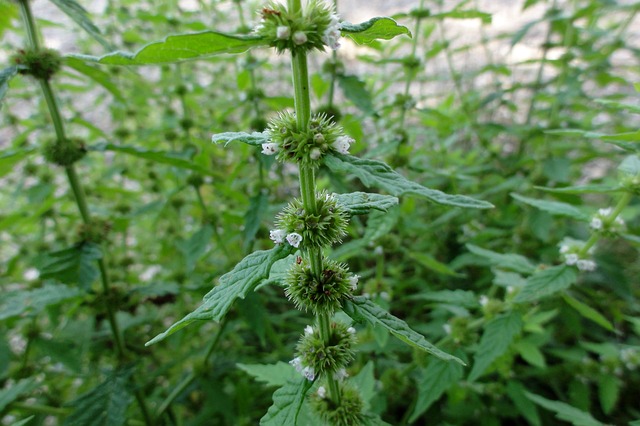 |  |  |  |  |
 |  |
Gipsywort is a perennial plant that grows up to a meter, with a strong four-sided stem, similar to a large nettle. The leaves are whole, elongated lanceolate, 3-8 cm long, toothed along the edge. The flowers are small, white, with red inclusions, forming a ring around the base of the leaves. Gipsywort blooms for three months, starting in July. Flowers are pollinated by flies.
Gipsywort grows in wet places, sometimes even flooded.
The above-ground part of the plant is used both fresh and dried. Extracts, powders and preparations are made from the plant.
Polish scientists have found that the plant gains its greatest value in August, so it is best to harvest this plant from the end of July until September.
Harvest the tops of the plant, excluding the thick stem. Then make small bundles from it and hang it in a well-ventilated room. In order to preserve valuable substances, the plant should be dried as quickly as possible after collection.
Cardiac glycosides, lycopene, resins, bitter substances, essential oils have been found in the stems, flowers and leaves of Gipsywort . The plant also contains vitamin C, carotene and antioxidants.
Medicinal significance
Fluorine and manganese are found in microscopic amounts in the plant. The medicinal value of the plant is related to its organic acids (rosmarinic acid, caffeic acid, cinnamic acid), tannins, bioflavonoids. These elements have a complex effect, for example, if manganese or tannins are removed from the plant extract, then its effect on the thyroid gland disappears.
The main component of Gipsywort extract is lithospermic acid, which reduces the activity of the thyroid gland, so this plant can be successfully used to treat hyperthyroidism. It normalizes iodine metabolism, lithospermic acid reduces the production of thyroxine and other thyroid hormones. The plant extracts have a gentle but always noticeable effect. The patient's irritability decreases, the heart rate decreases, the trembling in the cheeks disappears.
Gipsywort preparations also affect the heart muscle. The effect of the plant is similar to the alkaloid quinidine. The alkaloid is effective in heart attacks, Graves' disease, heart rhythm disorders (extrasystole) and endocarditis.
When using Gipsywort preparations, improvements are felt after two weeks. Increased sweating, increased heart contractions disappear, mood improves, nervousness disappears, tremors in the body disappear and work capacity increases.
In folk medicine, the above-ground part of the plant is used: stems, leaves and flowers. The plant is used to treat Graves' disease and to reduce thyroid nodules. Gipsywort is so great that it's impossible to overdose. This feature is important for people with hyperthyroidism.
The plant is successfully used to treat neurosis and disorders of the nervous system, insomnia and unreasonable anxiety. The setting of the plant is a good remedy to deal with attacks of increased heartbeats, to correct disturbed heart rhythm (extrasystole), excessively frequent heart rhythm, hypertension. The remedy slows down the pulse, making it deeper and more even. Gipsywort works especially well with heart mother when treating heart diseases.
Gipsywort is also used to regulate other hormonal changes, such as the menstrual cycle, mastopathy. The plant will also help in cases of diseases accompanied by intoxication and high temperature.
The tannins in the Gipsywort also help in case of a prolonged cough. Plant extracts have a beneficial effect on blood composition and are also able to stop bleeding.
When using the plant in various mixtures, it should be taken into account that it lowers blood pressure and has diuretic properties.
